Recently I was asked how to see changes in Microsoft Word/Excel documents stored in git.
I researched the topic and below are my experiments. I use Linux and LibreOffice, but the steps are generic enough to be ported to other platforms.
Setup
Install meld, pandoc and unoconv:
$ sudo apt install meld pandoc unoconv
Create an empty git repo:
$ mkdir git-diff
$ cd git-diff
$ git init
In this directory create new Microsoft Word and Excel files to work with.
Create a new word.docx Microsoft Word file with the text “hello” and commit it:
$ git add word.docx
$ git commit -m "Add word.docx v1"
Change the text to “Hello world!”, save the file and commit it:
$ git add word.docx
$ git commit -m "Change word.docx v2"
Create a new excel.xlsx Microsoft Excel file the text “1”, “+”, “1”, “=”, “2” in separate cells and commit it:
$ git add excel.xlsx
$ git commit -m "Add excel.xlsx v1"
Change the text in cells to “1”, “+”, “2”, “=”, “3”, save the file and commit it:
$ git add excel.xlsx
$ git commit -m "Change excel.xlsx v2"
Now git log looks like this:
$ git log --oneline
31cb76d (HEAD -> master) Change excel.xlsx v2
07e90fe Add excel.xlsx v1
f02d3c0 Change word.docx v2
de8f24e Add word.docx v1
Let’s see what changed:
$ git diff de8f24e 31cb76d
diff --git a/excel.xlsx b/excel.xlsx
new file mode 100644
index 0000000..4c8c59b
Binary files /dev/null and b/excel.xlsx differ
diff --git a/word.docx b/word.docx
index 5e522aa..d263873 100644
Binary files a/word.docx and b/word.docx differ
Not pretty, but anticipated.
Git diff
Let’s fix that using information from the Git book.
Add the below to .gitattributes file:
*.docx diff=docx
*.xlsx diff=xlsx
The above lines say that *.docx files should go through the docx filter and *.xlsx files should go though the xlsx filter.
A filter is a program that reads a binary file and prints its textual presentation.
Let’s setup the filters now.
I use pandoc for Word and unoconv for Excel to keep things more interesting.
Add the below to .git/config:
[diff "docx"]
textconv = pandoc --to=plain
[diff "xlsx"]
textconv = unoconv --format=csv --stdout
Let’s see the changes now:
$ git diff de8f24e f02d3c0
diff --git a/word.docx b/word.docx
index 5e522aa..d263873 100644
--- a/word.docx
+++ b/word.docx
@@ -1 +1 @@
-hello
+Hello world!
$ git diff 07e90fe 31cb76d
diff --git a/excel.xlsx b/excel.xlsx
index 547f86a..4c8c59b 100644
--- a/excel.xlsx
+++ b/excel.xlsx
@@ -1 +1 @@
-1,+,1,=,2
+1,+,2,=,3
It works!
Git difftool
Textual git diff is great, but what about git difftool? I have meld as my default difftool and running the command below shows binary gibberrish.
$ git difftool de8f24e f02d3c0
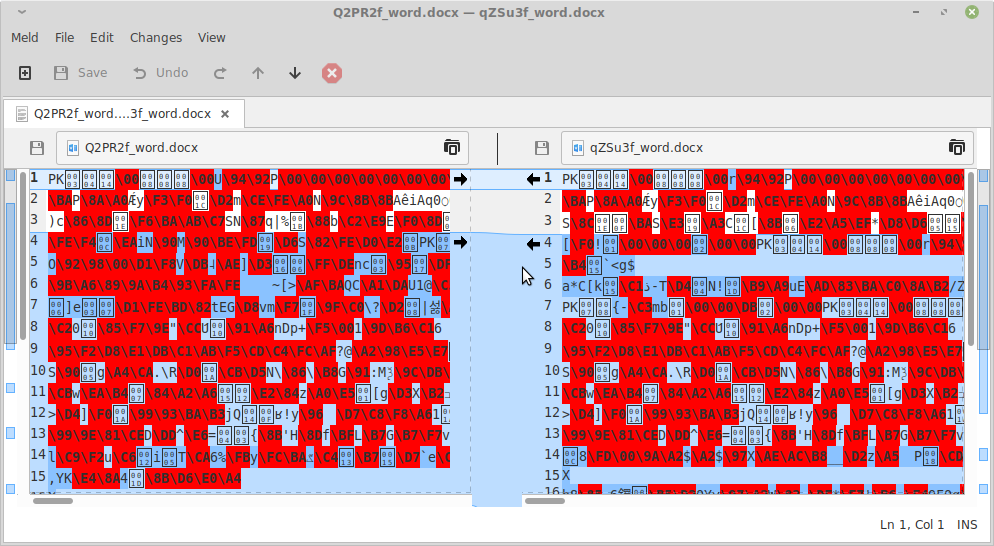
From the Git documentation:
A textconv, by comparison, is much more limiting. You provide a transformation of the data into a line-oriented text format, and Git uses its regular difftools to generate the output.
Simply put, textconv only works for the internal diff, not for difftool.
To make difftool work, add the below to .git/config:
[difftool "docx"]
cmd = t1=`mktemp` && `pandoc --to=plain $LOCAL --output=$t1` && t2=`mktemp` && `pandoc --to=plain $REMOTE --output=$t2` && meld $t1 $t2 && rm -f $t1 $t2
[difftool "xlsx"]
cmd = t1=`mktemp` && `unoconv --format=csv --stdout $LOCAL >$t1` && t2=`mktemp` && `unoconv --format=csv --stdout $REMOTE >$t2` && meld $t1 $t2 && rm -f $t1 $t2
Now you can run:
$ git difftool --tool docx de8f24e f02d3c0
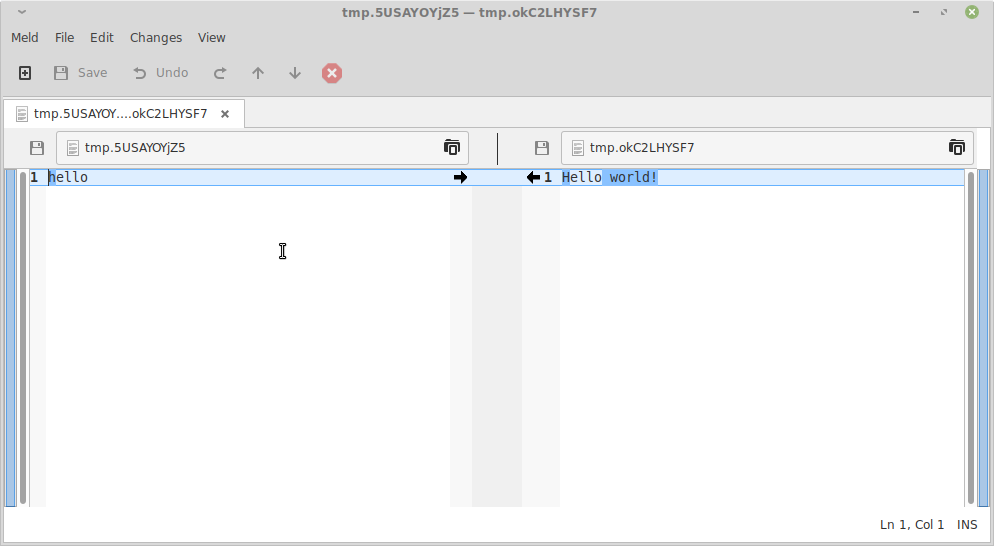
$ git difftool --tool xlsx 07e90fe 31cb76d
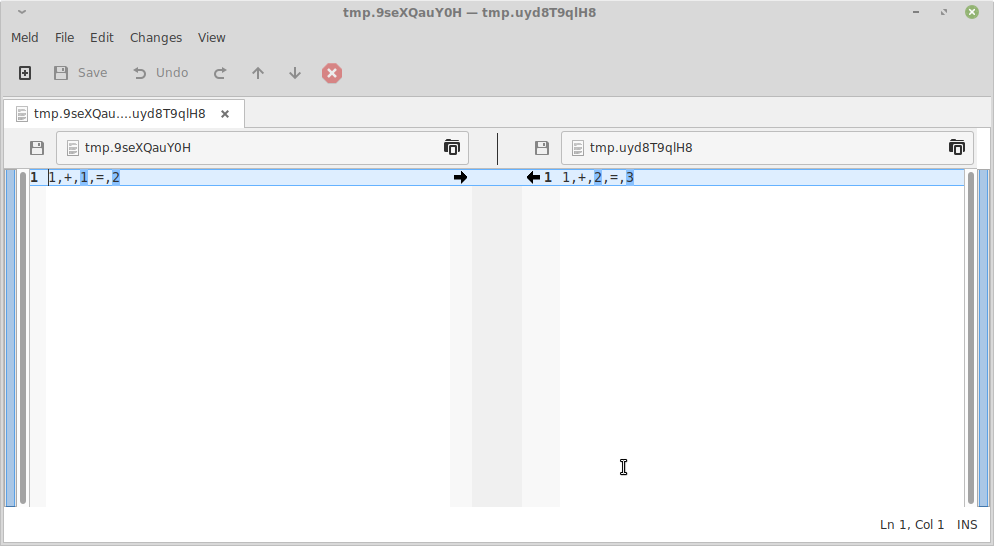
Let’s add some more difftools.
Generic binary diff:
[difftool "xxd"]
cmd = t1=`mktemp` && `xxd $LOCAL >$t1` && t2=`mktemp` && `xxd $REMOTE >$t2` && meld $t1 $t2 && rm -f $t1 $t2
$ git difftool --tool xxd de8f24e f02d3c0
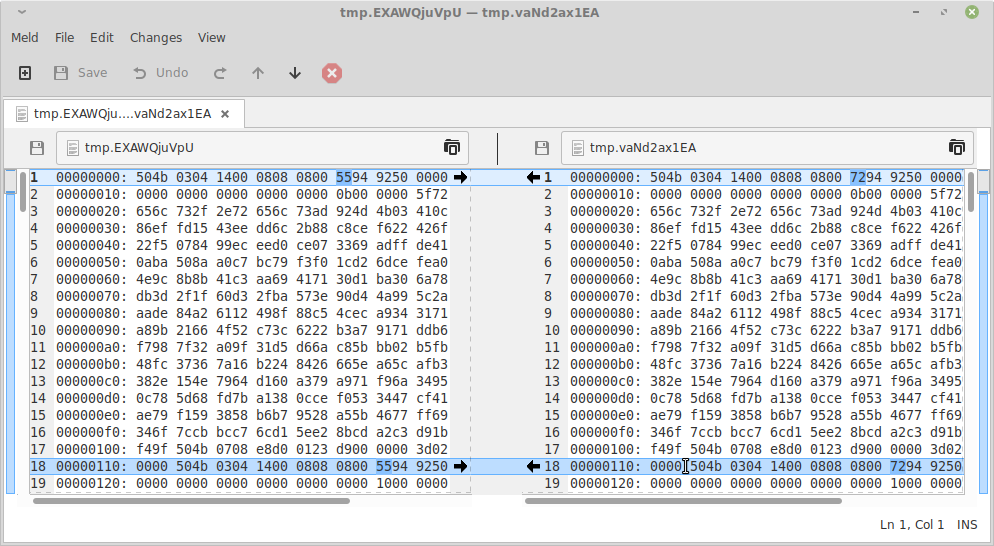
Both *.docx and *.xlsx files are zipped archives of xml files and we can be compared using unzip:
[difftool "unzip-v"]
cmd = t1=`mktemp` && `unzip -v $LOCAL >$t1` && t2=`mktemp` && `unzip -v $REMOTE >$t2` && meld $t1 $t2 && rm -f $t1 $t2
[difftool "unzip-c"]
cmd = t1=`mktemp` && `unzip -c $LOCAL >$t1` && t2=`mktemp` && `unzip -c $REMOTE >$t2` && meld $t1 $t2 && rm -f $t1 $t2
$ git difftool --tool unzip-v de8f24e f02d3c0
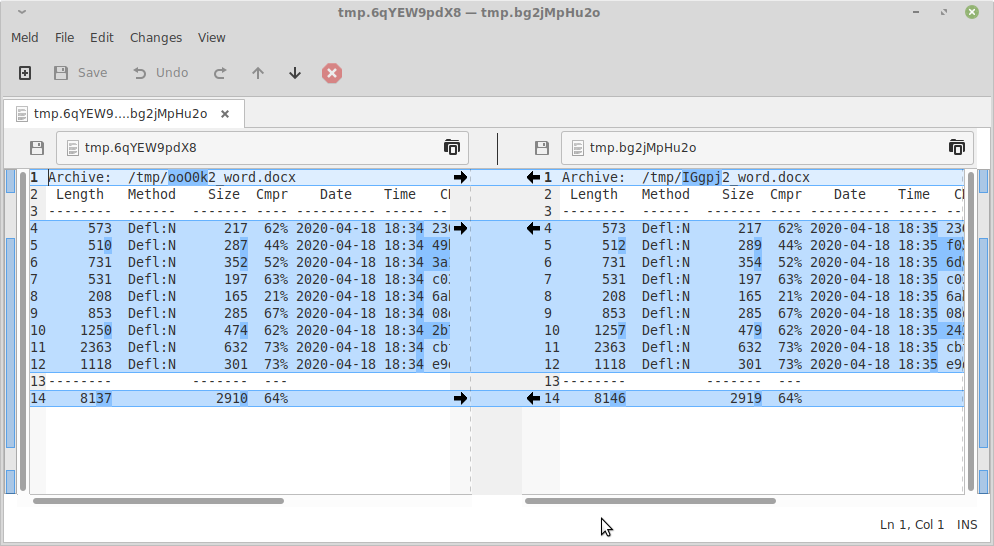
$ git difftool --tool unzip-p de8f24e f02d3c0
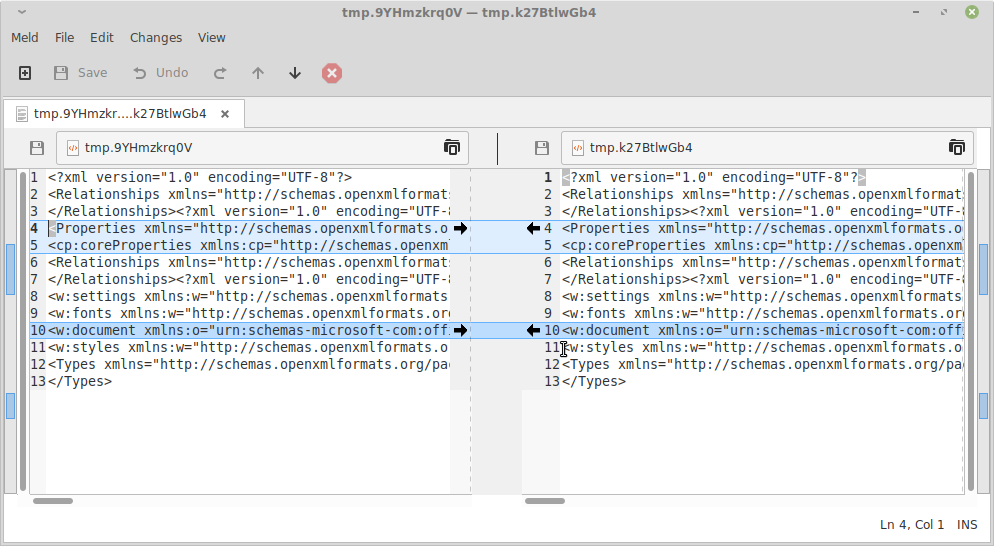
You can list available difftools:
$ git difftool --tool-help
Git auto difftool
Both docx and xlsx difftools work, but one question remains? If we are happy with textconv(s) for diff why not use them for difftool without specifying –tool? It was explained above that it doesn’t work out of the box, but let’s see what can be done.
Add the below to .git/config:
[diff]
tool = "auto"
[difftool "auto"]
cmd = git-auto-diff.sh $LOCAL $REMOTE
Save the below bash script somewhere in your $PATH:
git-auto-diff.sh:
#!/bin/bash
DIFF=meld
if [[ $# -ne 2 ]]; then
echo "Usage: $(basename $0) <FILE1.EXT> <FILE2.EXT>"
exit 1
fi
FILE1=$1
FILE2=$2
EXT1=${FILE1##*.}
EXT2=${FILE2##*.}
if [[ $EXT1 != $EXT2 ]]; then
echo "Extensions don't match, fallback to $DIFF"
$DIFF $FILE1 $FILE2
exit
fi
TEXTCONV=$(git config --get diff.$EXT1.textconv)
if [[ $? -ne 0 ]]; then
echo "'$EXT1' textconv not found, fallback to $DIFF"
$DIFF $FILE1 $FILE2
exit
fi
$DIFF <($TEXTCONV $FILE1) <($TEXTCONV $FILE2)
The script checks that both file extensions are equal, there is a known textconv for it, converts both file and runs the default diff tool, which is meld in my case. Otherwise, it falls back to the default diff tool.
Now you can run:
$ git difftool de8f24e f02d3c0
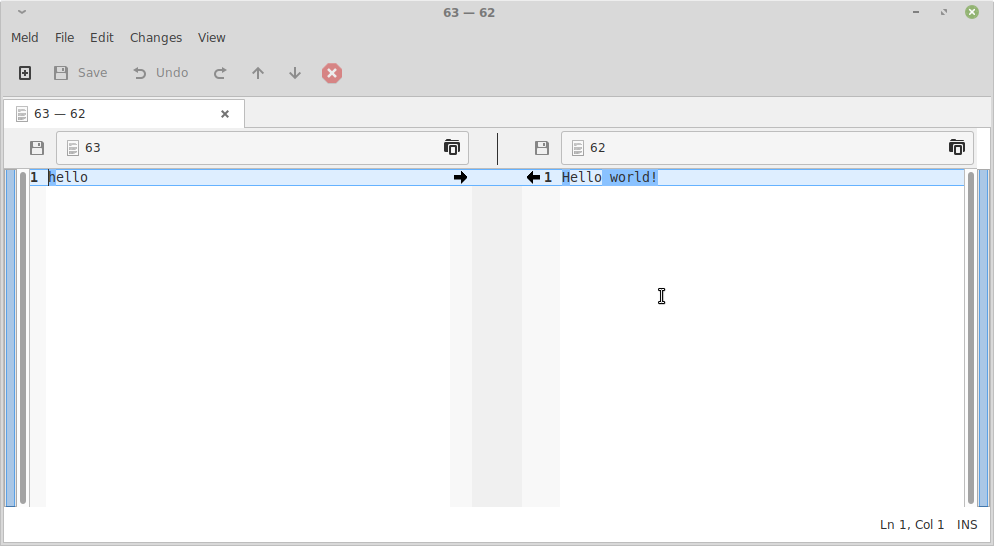
$ git difftool 07e90fe 31cb76d
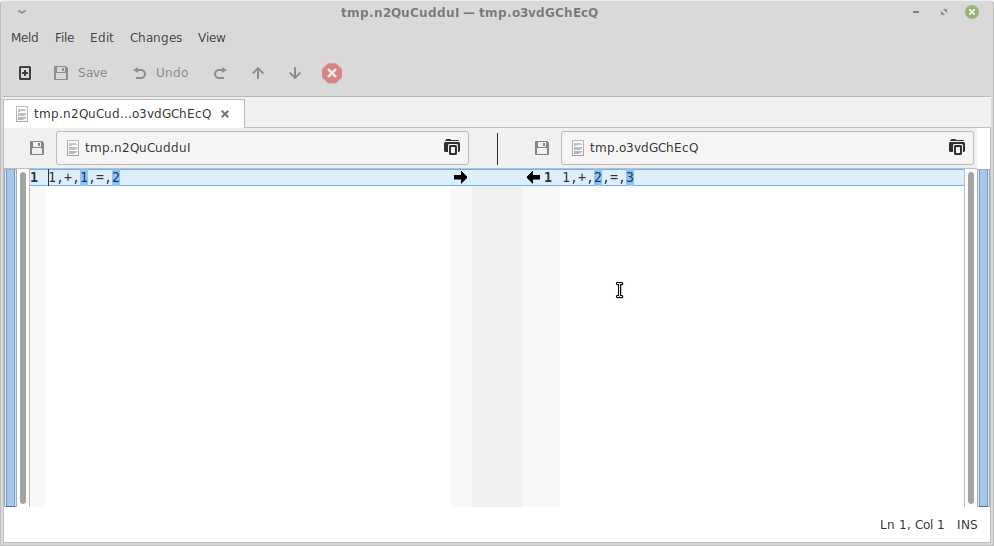
And it works! I’m not going to claim that this is a production ready solution, but as a prove of concept it works just fine.
Still, I found that unoconv is not stable for this use case and something simpler like Gnumeric or xlsx2csv should be used instead.
Code
You can find the code here.
$ git clone https://github.com/ten0s/blog-code.git
$ cd blog-code/git-difftool-and-binaries-files
$ git config --local include.path $PWD/.gitconfig
$ sudo apt install meld pandoc unoconv
Copy git-auto-diff.sh to $PATH and you are all set!